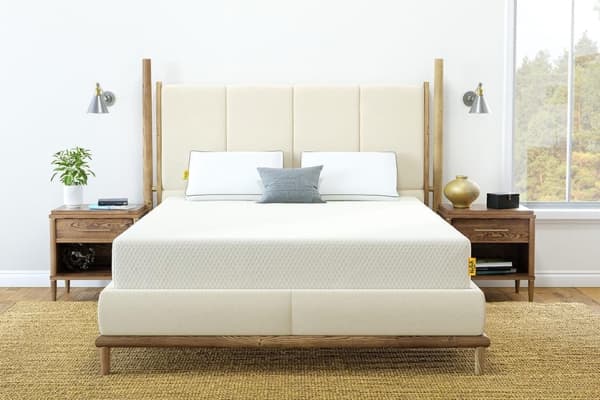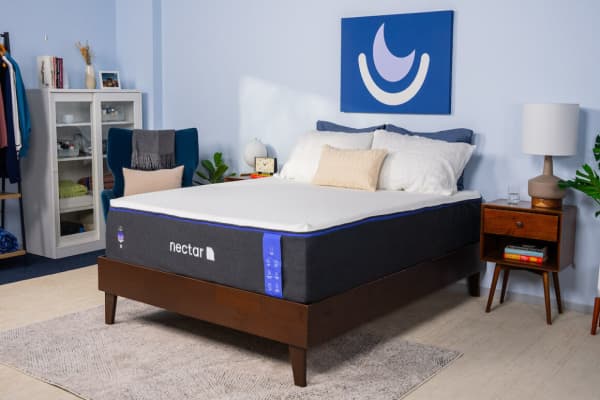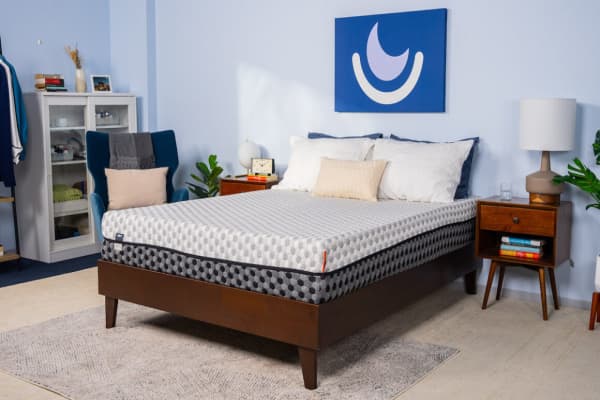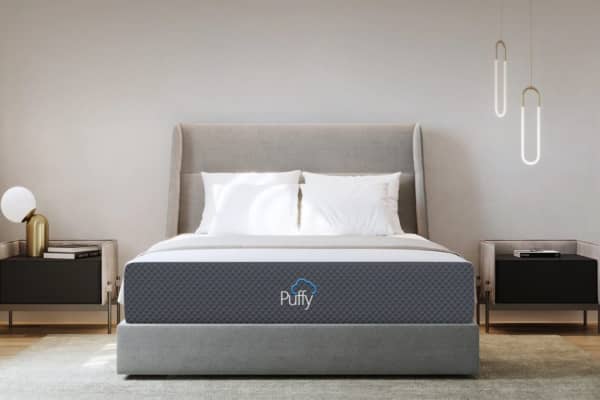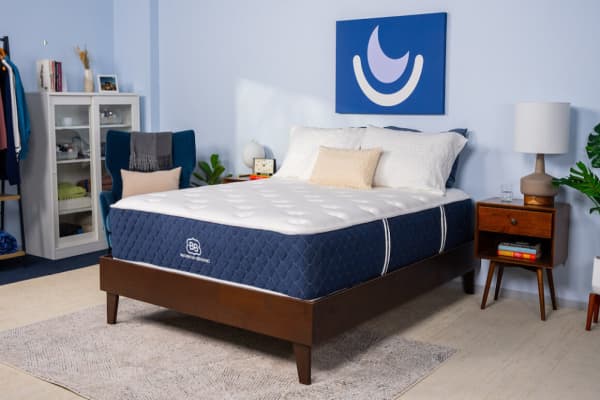Sleepers who weigh under 130 pounds have distinct needs when it comes to finding the right mattress. Lightweight sleepers need a bed that offers a balance between cushioning and support to maintain healthy spinal alignment and avoid pressure points.
We’ll cover our picks for the best mattresses for lightweight sleepers. We’ll also help you understand the unique needs of sleepers under 130 pounds and the best types of mattresses, materials, and firmness for lightweight individuals.
Find Your Perfect Mattress
We know mattresses work differently for different types of sleepers. Use the filters below to help narrow down your options for your best bed.
Read on to see why the following five options made our top picks list of 2024’s best mattresses for lighter weight sleepers.
Sleep Doctor’s Picks
Best Overall Mattress
Nolah Original 10
Sleep Doctor’s Review
The Nolah Original 10 excels at relieving pressure and providing the right level of support for sleepers who weigh under 130 pounds. The multiple layers of plush foam also isolate motion well for couples sharing a bed.
Buy From NolahCouples
Medium
Close-Conforming Foam
Good Value
Pros
- Foam layers with a medium (5) feel work well for most lightweight sleepers
- Sleeps fairly cool for an all-foam bed
- Comes with a limited lifetime warranty and 120-night sleep trial
Cons
- Provides just average pressure relief
- Prone to off-gassing
- Doesn’t offer enough support for co-sleepers over 230 pounds
Why We Like It
All-foam beds like the Nolah Original are excellent choices for lightweight sleepers. Nolah’s unique foam formulations offer a great mix of contouring, responsiveness, and support for sleepers with a smaller frame.
How Does It Feel?
The Nolah Original 10 is a 10-inch all-foam mattress with a medium (5) feel that’s ideal for most lightweight sleepers. This bed features a 2-inch top layer of Nolah’s proprietary polyfoam that’s designed to evenly distribute your weight and prevent the build up of body heat. An additional layer of responsive polyfoam and a thick core of high-density foam add support and stability.
The Nolah Original’s layers offer plenty of contouring and pressure relief for lighter people prone to pressure points, especially side sleepers. However, we found it’s also supportive enough for back and stomach sleepers under 130 pounds. The overall construction is relatively cool compared to many all-foam beds.
Best Value Mattress
Nectar Mattress
Sleep Doctor’s Review
The Nectar Mattress combines quality materials and plush comfort for lightweight sleepers. Gel-infused memory foam gives the deep contouring needed to relieve pressure, while a full year sleep trial and a low price tag make this bed an excellent value.
Buy From NectarBudget Shoppers
Medium Firm
Close-Conforming Foam
Great Value
Pros
- Nectar’s memory foam nearly eliminates motion transfer
- Price-point well below the average foam mattress
- Comes with a limited lifetime warranty and 365-night sleep trial
Cons
- Highly contouring surface can stifle movement
- Average temperature regulation may not be enough for hot sleepers
- May be too firm for lighter individuals who prefer a plush bed
Why We Like It
With excellent pressure relief and ample support, we think the Nectar Mattress will meet the needs of most lightweight sleepers. However, what really stood out to our testing team was a price tag that’s well below the average for an all-foam bed.
How Does It Feel?
The 12-inch, medium firm (6) Nectar Mattress is an all-foam bed with a memory foam and polyfoam comfort system. Gel-infused memory foam in the top layer provides excellent contouring and pressure relief. An additional layer of polyfoam adds a slight springiness to the feel of the bed, while the thick support core keeps the Nectar Mattress supportive and durable.
Our lighter testers were impressed with the Nectar Mattress’ ability to ease tension at key pressure points while supporting the spine in every sleep position. The Nectar provides substantial pressure relief and support for side, back, and stomach sleepers under 130 pounds. Couples should also enjoy the bed’s outstanding motion isolation.
Best Mattress for Side Sleepers
Layla Memory Foam Mattress
Sleep Doctor’s Review
The Layla Memory Foam Mattress’ plush, deeply contouring memory foam offers very good pressure relief for lightweight side sleepers. The clever, flippable design with two firmness levels also makes this a versatile choice for sleepers who want more options or who may need to adjust the firmness level in the future.
Buy From LaylaSide Sleepers
Medium Soft, Firm Sides
Close-Conforming Foam
Great Value
Pros
- Very good pressure relief for lightweight side sleepers
- Flippable design offers a medium soft (4) side and a firm (7) side
- Comes with a lifetime limited warranty and a 120-night sleep trial
Cons
- Average comfort for lightweight back and stomach sleepers
- Edges sink considerably under weight
- The soft side’s deep contouring can make it more difficult to change positions
Why We Like It
The Layla Memory Foam Mattress is plush and cushiony yet supportive for lightweight people who sleep on their side. The memory foam comfort layer eases tension while the polyfoam adds support and ensures the bed stays relatively cool throughout the night. The flippable design makes this bed one of the more versatile options on the market.
How Does It Feel?
The Layla Memory Foam Mattress is a flippable memory foam bed that offers two firmness options in one. Simply flip the mattress to choose between a medium soft (4) side and a firm (7) side. The bed features copper- and gel-infused memory foam on each side. The softer side also includes a layer of polyfoam.
The softer side’s deeply contouring feel is one of the most comfortable beds for lighter side sleepers that we’ve tested. Layla’s memory foam hugs the body, providing considerable pressure relief for the hips and shoulders. This construction also significantly reduces motion transfer for couples sharing a bed.
Best Mattress for Back Pain
Puffy Cloud Mattress
Sleep Doctor’s Review
The Puffy Cloud Mattress received top scores from our lightweight back and side sleepers. The bed’s plush comfort comes from its cushioning memory foam top layer that hugs the spine and relieves tension in the lower back. The bed’s medium (5) firmness is also supportive enough to ensure healthy spinal alignment.
Buy From PuffyBack Sleepers
Medium
Close-Conforming Foam
Fair Value
Pros
- Excellent comfort for lightweight back and side sleepers
- Standout motion isolation among all-foam mattress models
- Comes with a limited lifetime warranty and a 101-night sleep trial
Cons
- Stomach sleepers may find the mattress too soft
- Hot sleepers may get too warm
- Body-hugging feel can make it harder to move around
Why We Like It
The Puffy Cloud Mattress is one of the most comfortable and supportive mattresses for lightweight sleepers that we’ve tested. Its excellent balance of pressure relief and support make this a great choice for sleepers who experience back pain.
How Does It Feel?
The Puffy Cloud Mattress is a 10-inch all-foam bed with a medium firmness level. The bed features a memory foam and polyfoam comfort system and a thick polyfoam support core. The memory foam layer helps evenly distribute body weight and relieve tension at key pressure points, while the polyfoam layers provide balanced support to the spine.
Our lightweight sleep testers were impressed by the Puffy Cloud Mattress’ performance. The bed’s memory foam layer offered ideal cushioning for the hips and shoulders of our side sleepers and the lumbar region for our back sleepers. However, despite specially formulated cooling layers, the Puffy Cloud Mattress has a tendency to retain some body heat, which may bother people who sleep hot.
Best Mattress for Pressure Relief
Brooklyn Bedding Signature Hybrid
Sleep Doctor’s Review
The Brooklyn Bedding Signature Hybrid offers versatile comfort for lightweight sleepers. With three firmness options, this bed is comfortable for back, side, and stomach sleepers alike. The hybrid design has substantial pressure relief without sacrificing ease of movement, and the bed’s pocketed coils impart a slight bounce and plenty of support.
Buy From Brooklyn BeddingCombination Sleepers
Soft, Medium Firm, Firm Options
Bouncy, Supportive Surface
Great Value
Pros
- Hybrid design combines deep pressure relief and responsive support
- Three firmness levels to choose from
- Isolates motion while maintaining easy movement
Cons
- Performance varies significantly between firmness levels
- Firm option does have enough cushioning for lighter individuals
- 10-year limited warranty is shorter than some competitors
Why We Like It
The Brooklyn Bedding Signature Hybrid combines foam layers with a pocketed coil support core. This hybrid design offers an impressive mix of pressure relief and excellent support with a slight bounce. As a result, the soft and medium firm models of the Brooklyn Bedding Signature Hybrid have the contouring needed for sleepers with smaller builds.
How Does It Feel?
The Brooklyn Bedding Signature Hybrid comes in three firmness options: medium soft (4), medium firm (6), and firm (8). The bed features a cotton cover with a quilted polyfoam layer for added plushness. Each version has a two-layer comfort system with different foam formulations to achieve the varying firmnesses. All models have an 8-inch support core of pocketed coils and a high-density polyfoam base layer for added stability.
The medium soft version of the Brooklyn Bedding Signature Hybrid offered the best pressure relief for our side sleepers under 130 pounds, who said they need extra cushioning for their hips and shoulders. Our lightweight back sleepers also enjoyed the contouring of the softer option. The medium firm version had the best level of support for lighter stomach sleepers.
Weight disclaimer
Please note: For the purposes of this page, we are referring to individuals who weigh 130 pounds or less. Although we use the terms “light” or “lightweight” for brevity and convenience, we do not use weight categories such as “average” or “overweight,” as they can be misleading and dependent on the individual.
We use weight categories as a practical standard of size when discussing how mattresses interact with sleepers’ bodies. We have found that individuals who weigh under than 130 pounds generally have similar needs for a mattress in terms of firmness, thickness, and other factors, with small indivi.dual variations
Why You Should Trust Us
Our team includes a diverse set of testers with different body types and preferred sleeping positions. To find quality beds for sleepers who weigh under 130 pounds, we evaluated dozens of the best mattresses and narrowed down the selection to those best tailored to the needs of lightweight sleepers.
More Mattress Options for Specific Needs
Understanding the Unique Mattress Needs of Lightweight Sleepers
Keeping your body weight in mind when shopping for a mattress can help you find a bed with the ideal level of contouring, firmness, and support for your needs. Sleepers who weigh under 130 pounds place less pressure on their mattress than people with a higher body weight. As a result, lighter individuals tend to prefer softer mattresses than people who weigh over 130 pounds.
Choosing a mattress that suits your body weight is important because a mattress designed for heavier individuals may be too firm and lack the cushioning needed by lightweight sleepers. If a mattress is excessively firm for your build, it can create pressure points, causing discomfort and interrupting sleep. Additionally, lightweight sleepers may not sink deep enough into a firm mattress, resulting in improper spinal alignment.
Challenges for lightweight sleepers:
- Finding the right balance between cushioning and support for their build
- Excessive firmness causes pressure points
- Inadequate contouring leads to poor spinal alignment
What lightweight sleepers need:
- Deeper contouring to prevent pressure points
- Adequate compression to promote healthy spinal alignment
- Enough support to avoid sinking too deeply
Optimizing Support and Comfort for Lightweight Sleepers
Each sleep position requires different levels of firmness, support, and pressure relief to evenly distribute body weight and maintain healthy spinal alignment. At the same time, a person’s body weight also plays a significant role in determining their ideal firmness level.
We use a 10-point mattress firmness scale, with 1 being the softest and 10 the firmest. While everyone has individual preferences, in general we’ve found that the ideal mattress firmness range for sleepers under 130 pounds is between soft (3) and medium firm (6) depending on their preferred sleep position.
Ideal Mattress Firmness
| Under 130 lbs. | 130-230 lbs. | Over 230 lbs. | |
|---|---|---|---|
| Side Sleepers | Soft (3) to Medium (5) | Medium Soft (4) to Medium Firm (6) | Medium (5) to Firm (7) |
| Back Sleepers | Medium Soft (3) to Medium Firm (6) | Medium (5) to Firm (7) | Medium Firm (6) to Firm (8) |
| Stomach Sleepers | Medium Soft (4) to Medium Firm (6) | Medium Firm (6) to Firm (7) | Medium Firm (6) to Extra Firm (9) |
Best Mattress Types for Lightweight Sleepers
Lightweight sleepers typically sleep well with a soft to medium firm mattress that has adequate cushioning. These qualities can be found in a variety of mattress types, each of which may appeal to different types of sleepers.
- Foam: All-foam beds are a popular choice for sleepers under 130 pounds due to their conforming and pressure-relieving properties. These mattresses typically provide a plush and cushioning feel, hugging the body’s curves and preventing pressure points from forming. Memory foam mattresses are often prized for their contouring abilities and may be a particularly good choice for lightweight side sleepers.
- Latex: Latex mattresses are made entirely from layers of natural or synthetic latex. They tend to have a more responsive and buoyant feel than memory foam beds, providing gentle support to the spine and facilitating easy movement. Latex beds can be a good option for lightweight sleepers who prefer a bouncier surface that doesn’t conform as closely to the body.
- Hybrid: Hybrid mattresses combine the responsive support of coils with the cushioning feel of foam or latex layers. Many lightweight sleepers enjoy the best hybrid mattresses since they often incorporate the best features of foam and innerspring beds, including excellent support with a slight bounce, ample pressure relief, and outstanding airflow and temperature regulation.
- Airbeds: An airbed mattress uses air chambers as its primary support system, allowing sleepers to adjust the firmness to their preference. These beds provide a customizable feel, with the ability to inflate or deflate the chambers to dial in comfort. Lightweight sleepers may appreciate airbed mattresses, especially if they share their bed with a sleep partner who needs a different firmness level.
Additional Mattress Features to Consider
In addition to mattress type and firmness, there are a few other features lightweight sleepers should consider to stay comfortable and get a restful night’s sleep.
| Mattress Feature | Description |
|---|---|
| Contouring | Contouring refers to the ability of a mattress to conform to the body’s curves and relieve pressure. This feature is particularly important for lightweight sleepers, who tend to need deeper contouring to avoid irritating pressure points. |
| Motion Isolation | Motion isolation describes how well a mattress minimizes the transfer of movement from one side of the bed to the other. This can be beneficial for lightweight sleepers who share a bed, as it reduces disruptions from a partner’s movements and promotes undisturbed sleep. |
| Temperature Regulation | This feature refers to a bed’s ability to dissipate heat and maintain a comfortable sleep temperature. Temperature regulation is important for sleepers who are prone to sleeping hot. |
| Ease of Movement | A mattress with good ease of movement makes it easy to change positions and get in and out of bed. |
| Edge Support | Edge support refers to whether or not a bed can support weight at its perimeter. Strong edge support increases the usable surface area of a bed. Softer mattresses can sometimes sag at the perimeter unless the manufacturer uses a foam encasement or thicker springs to reinforce the edges. |
How Can Couples With Different Body Weights Stay Comfortable?
Sharing a bed with a sleep partner who has a different body type can present a conundrum. Here are a few ways to compromise on a mattress and ensure both partners get a good night’s sleep:
- Mattress with a mid-range firmness: Choosing a bed in the middle of the firmness scale is often a safe bet for couples. Mattresses in the range of medium soft (4) to medium firm (6) provide versatile comfort that can work well for a range of body types.
- Adjustable airbeds: Airbed mattresses allow each sleeper to customize their comfort by changing the firmness level on their side of the bed. However, airbeds tend to be among the most expensive mattress types.
- Split mattresses: Many mattress brands offer split king mattresses. A split king is essentially two twin XL mattresses placed side by side. Each person can then choose the ideal firmness level for their side of the bed. Some mattress companies offer additional split sizes, such as split queen or split California king.
Ask the Sleep Doctor
Have questions about sleep? Submit them here! We use your questions to help us decide topics for articles, videos, and newsletters. We try to answer as many questions as possible. You can also send us an email. Please note, we cannot provide specific medical advice, and always recommend you contact your doctor for any medical matters.
